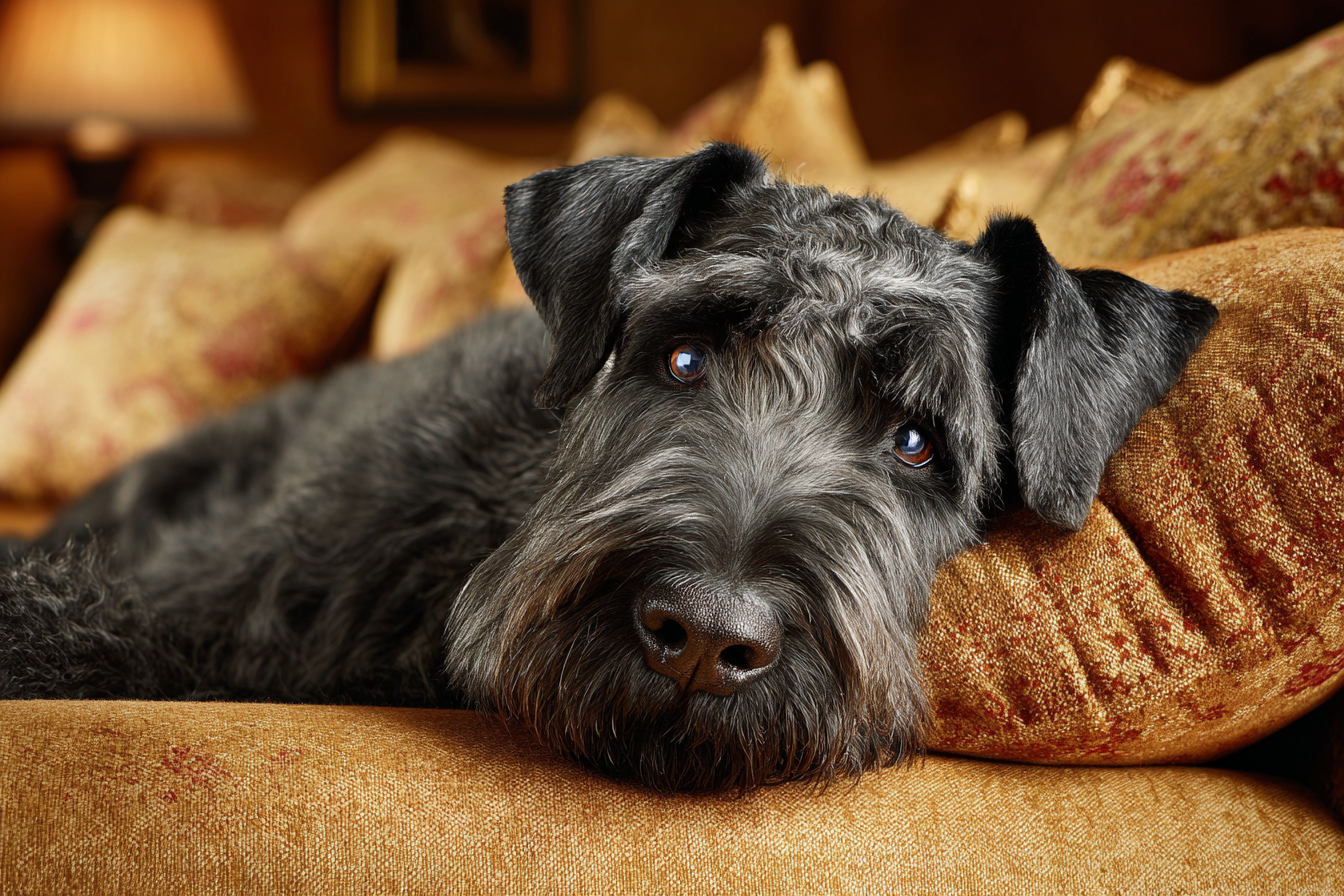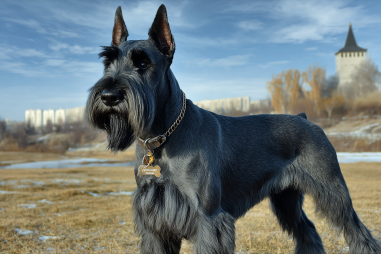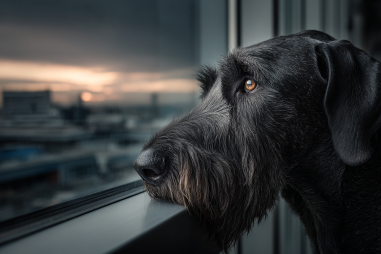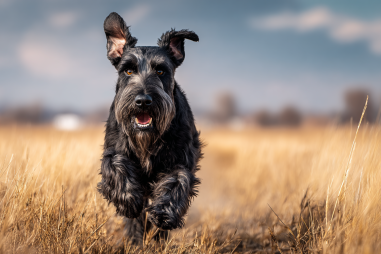Welcoming a Giant Schnauzer into your life means embarking on a rewarding journey with a loyal and intelligent companion. As with any breed, understanding the lifespan and natural aging process of a Giant Schnauzer is essential to ensuring they receive the best care throughout their years. In this article, we explore what you can expect as your Giant Schnauzer grows older, from average life expectancy and common signs of aging to necessary adjustments in care routines that support their health and happiness.
Average Lifespan of Giant Schnauzers
Giant Schnauzers are a robust and sturdy breed, known for their strength, intelligence, and protective nature. On average, a Giant Schnauzer’s lifespan ranges between 10 to 12 years, though many can live longer with proper care and a healthy lifestyle. This lifespan is fairly typical for large breeds, which generally have shorter life expectancies compared to smaller dogs.
Factors that influence longevity include genetics, nutrition, exercise, and quality of veterinary care. Responsible breeding practices and regular health screenings can help reduce the risk of inherited conditions, giving your Giant Schnauzer the best start in life. Understanding this typical lifespan sets realistic expectations and encourages proactive attention as your dog ages.
Signs of Aging to Watch For
As your Giant Schnauzer grows into their senior years, certain physical and behavioral changes will become noticeable. Recognizing these signs early allows you to adapt their care and make their golden years as comfortable as possible. Common signs of aging in Giant Schnauzers include:
- Graying Fur: Particularly around the muzzle and eyes, graying is a natural part of aging.
- Reduced Energy Levels: Older dogs typically slow down and may show less enthusiasm for playtime or long walks.
- Joint Stiffness or Lameness: Arthritis or stiffness affects mobility in many senior Giant Schnauzers, making movement more difficult.
- Changes in Vision and Hearing: Deterioration in eyesight and hearing can occur, leading to increased caution or anxiety.
- Altered Sleep Patterns: Your dog may sleep more during the day and have restless nights.
- Cognitive Changes: Signs of canine cognitive dysfunction, including confusion, disorientation, or decreased responsiveness, can appear.
Health Challenges in Senior Dogs
With age, Giant Schnauzers become more susceptible to a variety of health issues. Regular veterinary check-ups are vital to detecting and managing these challenges early on. Some common health problems in aging Giant Schnauzers include:
- Hip and Elbow Dysplasia: This genetic condition worsens with age and can cause significant joint pain.
- Arthritis: Degenerative joint disease is prevalent in older dogs, leading to stiffness and reduced mobility.
- Cardiac Issues: Heart disease risk increases, necessitating monitoring of cardiovascular health.
- Kidney and Liver Problems: Organ function can decline, impacting overall well-being.
- Obesity: Reduced activity combined with poor diet can lead to weight gain, exacerbating other health issues.
- Cancer: Incidence rises in senior dogs, with early detection improving prognosis.
Being mindful of these potential concerns allows for prompt intervention and tailored care that improve your pet’s quality of life.
Adjusting Care Routines as Your Dog Ages
Adapting your Giant Schnauzer’s daily routine to meet their changing needs is crucial as they enter their senior years. Consider the following adjustments:
- Exercise Moderation: While regular physical activity remains important, reduce the intensity and duration to prevent joint strain. Gentle walks and swimming are excellent low-impact options.
- Comfortable Living Spaces: Provide soft bedding and warm resting areas to help ease arthritis-related discomfort.
- Routine Veterinary Visits: Schedule bi-annual check-ups to closely monitor health issues and update vaccinations.
- Dental Care: Dental health affects overall well-being; brush teeth regularly and schedule professional cleanings.
- Monitor Weight: Keep an eye on body condition and adjust food intake as needed to maintain a healthy weight.
Creating a predictable, comfortable routine supports your senior dog’s physical and emotional needs.
Nutrition and Supplements for Aging Dogs
Proper nutrition plays a fundamental role in helping your Giant Schnauzer age gracefully. Senior dogs have different dietary requirements compared to their younger counterparts. Key nutritional considerations include:
- Calorie Control: Older dogs typically require fewer calories due to decreased activity. Feeding a balanced senior dog food helps prevent obesity.
- Protein Quality: High-quality, easily digestible protein supports muscle maintenance.
- Joint Support Supplements: Ingredients like glucosamine, chondroitin, and omega-3 fatty acids can promote joint health and reduce inflammation.
- Antioxidants: Vitamins E and C help combat oxidative stress linked to aging.
- Digestive Health: Fiber-rich diets and probiotics support gastrointestinal function.
Consult with your veterinarian to tailor a diet plan and supplement regimen that meets your Giant Schnauzer’s specific needs.
Exercise and Mental Health Benefits
Exercise is not only essential for maintaining physical health but also benefits your Giant Schnauzer’s mental well-being. Even as your dog ages and slows down, keeping them active helps preserve muscle tone, joint mobility, and cardiovascular fitness. Engaging in age-appropriate activities such as gentle walks, leash-free play in a safe area, and swimming can keep them moving without overexertion.
Mental stimulation is equally important. Giant Schnauzers are intelligent dogs that thrive on problem-solving and interaction. Puzzle toys, obedience training, and scent games help maintain cognitive function and reduce the risk of behavioral issues related to aging. Social interaction with family members and other dogs also supports emotional health.
Balancing physical and mental activities tailored to your dog’s capabilities contributes significantly to a happier, healthier senior life.
Caring Through the Years
Ultimately, understanding the lifespan and aging process of your Giant Schnauzer empowers you to be a proactive and loving caretaker. By recognizing the signs of aging, acknowledging health challenges early, and adapting nutrition and daily routines, you help your dog enjoy a comfortable and fulfilling life through their senior years. Regular veterinary care combined with your dedication creates the foundation for a strong bond that endures all stages of life.







